Attached files
| file | filename |
|---|---|
| 8-K - 8-K CHFC FEB 2017 INVESTOR CONFERENCE - TCF FINANCIAL CORP | chfc8-kchfckbwfeb2017inves.htm |
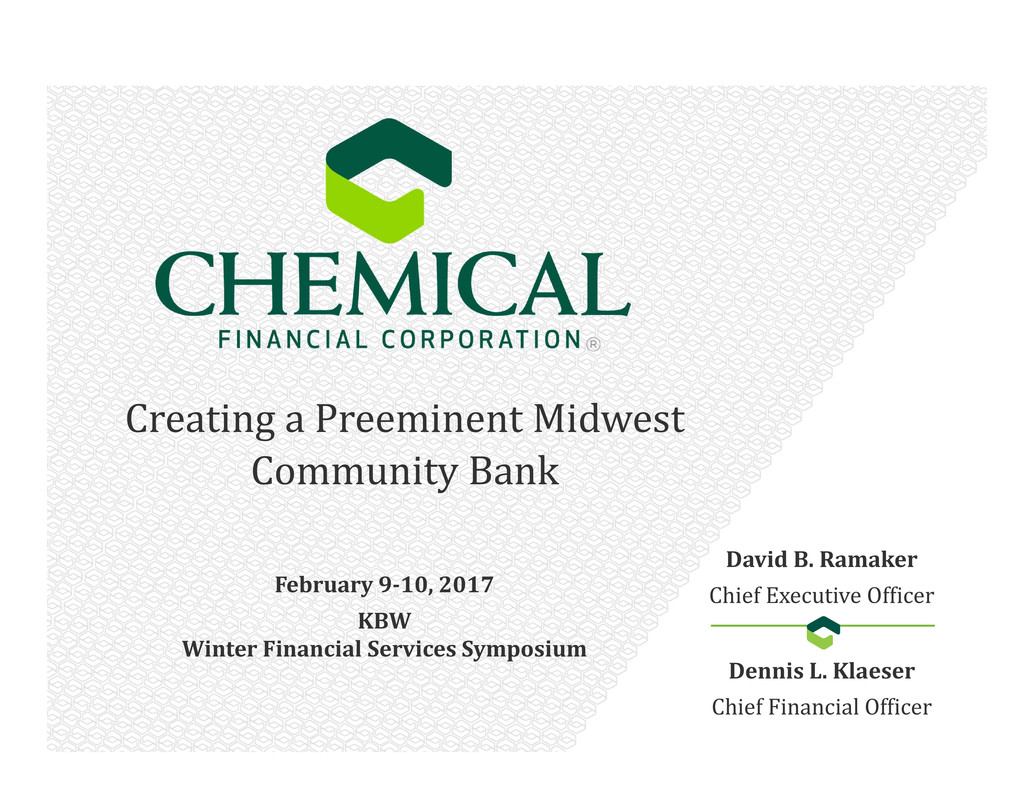
Creating a Preeminent Midwest
Community Bank
David B. Ramaker
Chief Executive Officer
Dennis L. Klaeser
Chief Financial Officer
February 9‐10, 2017
KBW
Winter Financial Services Symposium

This presentation and the accompanying presentation by management may contain forward-looking statements that are based on
management's beliefs, assumptions, current expectations, estimates and projections about the financial services industry, the
economy and Chemical Financial Corporation ("Chemical"). Words and phrases such as "anticipates," "believes," "continue,"
"estimates," "expects," "forecasts," "future," "intends," "is likely," "judgment," "look ahead," "look forward," "on schedule," “on track,”
"opinion," "opportunity," "plans," "potential," "predicts," "probable," "projects," "should," "strategic," "trend," "will," and variations of
such words and phrases or similar expressions are intended to identify such forward-looking statements. Such statements are
based upon current beliefs and expectations and involve substantial risks and uncertainties that could cause actual results to differ
materially from those expressed or implied by such forward-looking statements. These statements include, among others,
statements related to future levels of loan charge-offs, future levels of provisions for loan losses, real estate valuation, future levels
of nonperforming assets, the rate of asset dispositions, future capital levels, future dividends, future growth and funding sources,
future liquidity levels, future profitability levels, future deposit insurance premiums, future asset levels, the effects on earnings of
future changes in interest rates, the future level of other revenue sources, future economic trends and conditions, future initiatives
to expand Chemical’s market share, expected performance and cash flows from acquired loans, future effects of new or changed
accounting standards, future opportunities for acquisitions, opportunities to increase top line revenues, Chemical’s ability to grow
its core franchise, future cost savings, Chemical’s ability to maintain adequate liquidity and capital based on the requirements
adopted by the Basel Committee on Banking Supervision and U.S. regulators and future changes in laws and regulations
applicable to Chemical and the financial services industry in general. All statements referencing future time periods are forward-
looking.
Management's determination of the provision and allowance for loan losses; the carrying value of acquired loans, goodwill and
mortgage servicing rights; the fair value of investment securities (including whether any impairment on any investment security is
temporary or other-than-temporary and the amount of any impairment); and management's assumptions concerning pension and
other postretirement benefit plans involve judgments that are inherently forward-looking. There can be no assurance that future
loan losses will be limited to the amounts estimated. All of the information concerning interest rate sensitivity is forward-looking.
The future effect of changes in the financial and credit markets and the national and regional economies on the banking industry,
generally, and on Chemical, specifically, are also inherently uncertain. These statements are not guarantees of future performance
and involve certain risks, uncertainties and assumptions ("risk factors") that are difficult to predict with regard to timing, extent,
likelihood and degree of occurrence. Therefore, actual results and outcomes may materially differ from what may be expressed or
forecasted in such forward-looking statements. Chemical undertakes no obligation to update, amend or clarify forward-looking
statements, whether as a result of new information, future events or otherwise.
Forward-Looking Statements & Other
Information
2

This presentation and the accompanying presentation by management also contain forward-looking statements regarding
Chemical's outlook or expectations with respect to its merger with Talmer Bancorp, Inc. ("Talmer"), including the benefits of the
transaction, the expected costs to be incurred and cost savings to be realized in connection with the transaction, the expected
impact of the merger on Chemical's future financial performance and consequences of the integration of Talmer into Chemical.
Risk factors relating both to the merger and the integration of Talmer into Chemical after closing include, without limitation:
The anticipated benefits, including anticipated cost savings and strategic gains, may be significantly harder or take longer to
achieve than expected or may not be achieved in their entirety as a result of unexpected factors or events.
The integration of Talmer’s business and operations into Chemical may take longer than anticipated or be more costly than
anticipated or have unanticipated adverse results relating to Chemical's or Talmer’s existing businesses.
Chemical’s ability to achieve anticipated results from the merger is dependent on the state of the economic and financial
markets going forward. Specifically, Chemical may incur more credit losses than expected and customer and employee attrition
may be greater than expected.
The outcome of pending or threatened litigation, whether currently existing or commencing in the future, including litigation
related to the merger.
The challenges of integrating, retaining and hiring key personnel.
Failure to attract new customers and retain existing customers in the manner anticipated.
In addition, risk factors include, but are not limited to, the risk factors described in Item 1A of Chemical’s Annual Report on Form
10-K for the year ended December 31, 2015. These and other factors are representative of the risk factors that may emerge and
could cause a difference between an ultimate actual outcome and a preceding forward-looking statement.
Forward-Looking Statements & Other
Information (continued)
3
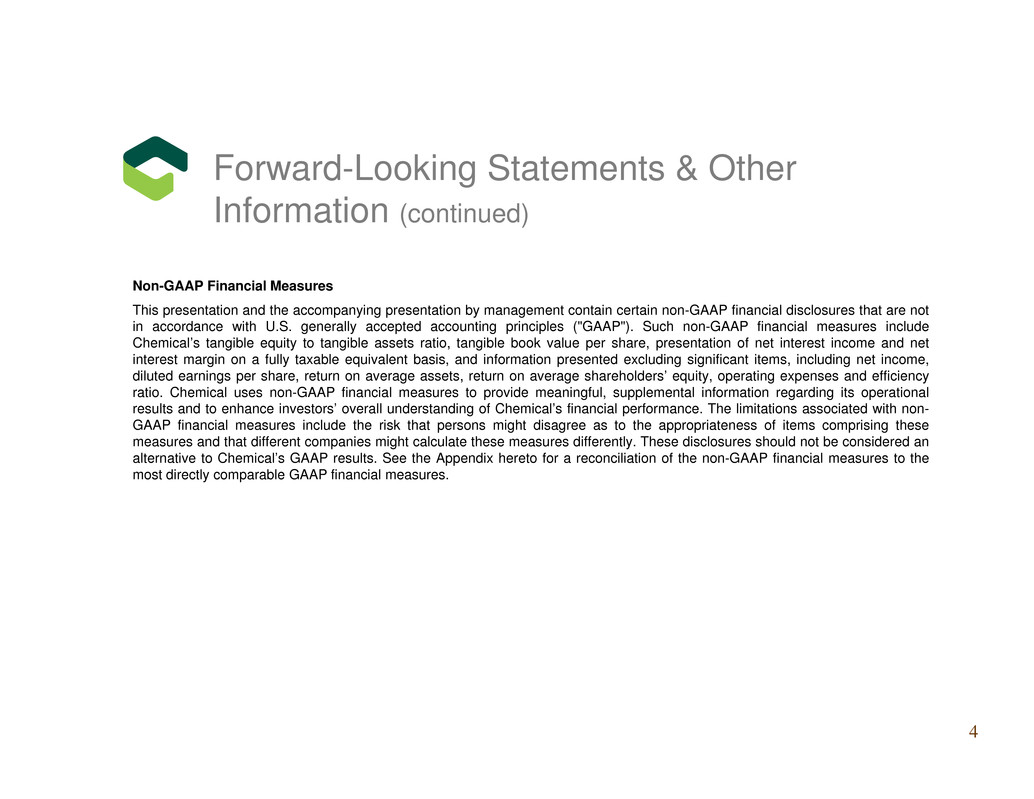
Non-GAAP Financial Measures
This presentation and the accompanying presentation by management contain certain non-GAAP financial disclosures that are not
in accordance with U.S. generally accepted accounting principles ("GAAP"). Such non-GAAP financial measures include
Chemical’s tangible equity to tangible assets ratio, tangible book value per share, presentation of net interest income and net
interest margin on a fully taxable equivalent basis, and information presented excluding significant items, including net income,
diluted earnings per share, return on average assets, return on average shareholders’ equity, operating expenses and efficiency
ratio. Chemical uses non-GAAP financial measures to provide meaningful, supplemental information regarding its operational
results and to enhance investors’ overall understanding of Chemical’s financial performance. The limitations associated with non-
GAAP financial measures include the risk that persons might disagree as to the appropriateness of items comprising these
measures and that different companies might calculate these measures differently. These disclosures should not be considered an
alternative to Chemical’s GAAP results. See the Appendix hereto for a reconciliation of the non-GAAP financial measures to the
most directly comparable GAAP financial measures.
Forward-Looking Statements & Other
Information (continued)
4

Emphasize our strategy of
being the Preeminent Midwest
Community Bank
5
4
1
Demonstrated track record of
organic growth2
High performing pro forma
profitability should drive upside3
Experienced and committed
Board and management team
Focus on what we can control
Created the largest community bank headquartered in Michigan
Our enhanced resources provide potential for significant organic growth in both
southeast Michigan and northeast Ohio
Proven organic growth initiatives
Leadership in EPS growth among peers (1)
Total Return out-performance (peers and indices) (1)
Pro Forma 1.2%+ ROA, ROATCE approaching 15%, low efficiency ratio
Stable, clean NIM, attractive asset quality, strong capital
Significant revenue enhancements available
Strong governance, holding company Board of Directors currently comprised
of 7 CHFC & 5 TLMR directors
Combination creates a strong, committed and experienced management team
Organic revenue growth and cost discipline
Concentrate on achieving cost savings and exploiting business synergy opportunities
Continue to build out and enhance risk management practices
(1) Source: SNL Geographic Intelligence
Overview
5

$17.4 billion in assets
Largest banking company headquartered and
operating branches in Michigan
Operates 249 banking offices primarily in Michigan,
Northeast Ohio and Northern Indiana
Local market knowledge and business development
opportunities led by 23 community-based advisory
boards
One of the largest trust and wealth management
operations of a Michigan-headquartered bank with
$4.4 billion in assets under management or custody
and another $1.3 billion in assets within the Chemical
Financial Advisors Program
Focused on realizing operating and business synergies
from Chemical / Talmer merger and enhancing
preparedness for future organic and acquisitive growth
$3.46 billion Market Capitalization (1)
(1) Based upon CHFC shares outstanding of 70.6 million and the CHFC stock price of $48.95 on February 1, 2017.
6
About Chemical Financial Corporation

“Local” community bank
Strong belief in the community banking concept
23 identified centers of influence
Community-driven leadership, rapid local response
Emphasis on building relationships
We know our markets, what works, and what does not work
Strong credit culture
Diversification
In-depth knowledge of our customers and markets
Underwriting discipline
Low cost, stable, core funding – starts at relationship level
Expense management and control
Clean balance sheet, solid capital ratios and intense focus on effective capital deployment
Identify, hire, motivate and retain talented individuals to carry out our relationship strategies
Sustain long-term growth through combination of organic and acquisitive growth
Higher lending limits provide enhanced middle market lending growth opportunities
Opportunities for fee income growth from Wealth Management and Mortgage Banking synergies
Future acquisitive growth opportunities in Michigan, Ohio, and Indiana
Scalable Core Strategies & Disciplines
Core Values
7
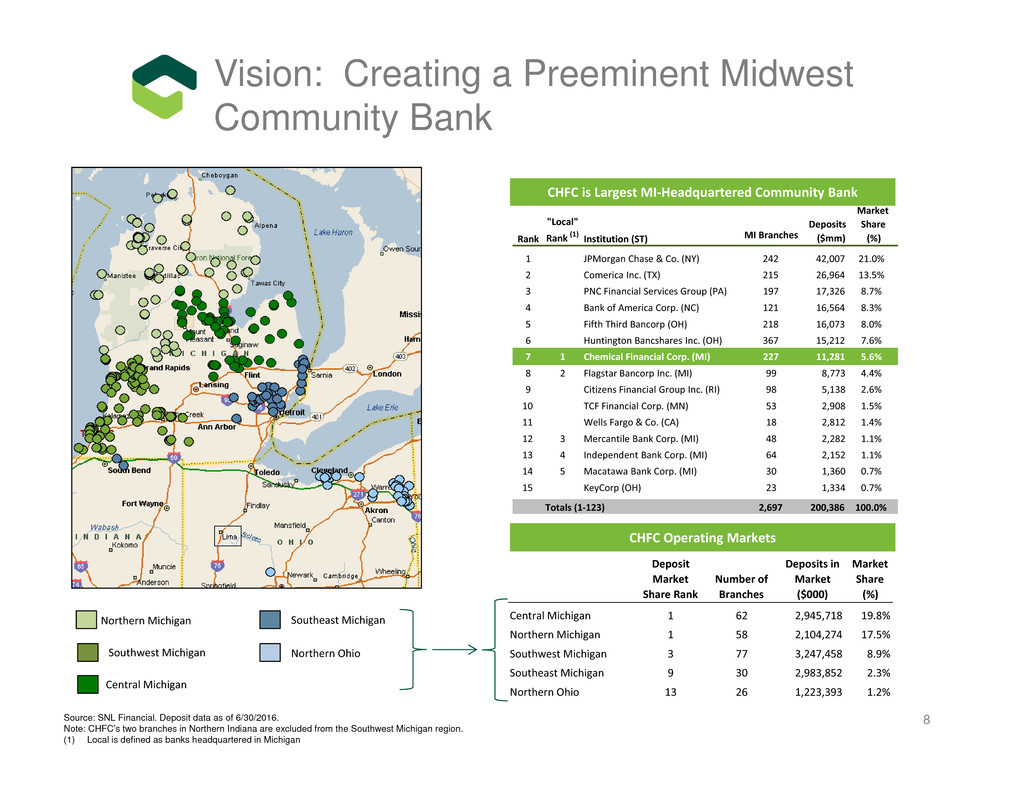
CHFC is Largest MI‐Headquartered Community Bank
CHFC Operating Markets
Source: SNL Financial. Deposit data as of 6/30/2016.
Note: CHFC’s two branches in Northern Indiana are excluded from the Southwest Michigan region.
(1) Local is defined as banks headquartered in Michigan
Northern Michigan Southeast Michigan
Southwest Michigan
Central Michigan
Northern Ohio
Deposit
Market
Share Rank
Number of
Branches
Deposits in
Market
($000)
Market
Share
(%)
Central Michigan 1 62 2,945,718 19.8%
Northern Michigan 1 58 2,104,274 17.5%
Southwest Michigan 3 77 3,247,458 8.9%
Southeast Michigan 9 30 2,983,852 2.3%
Northern Ohio 13 26 1,223,393 1.2%
Vision: Creating a Preeminent Midwest
Community Bank
Rank
"Local"
Rank (1) Institution (ST) MI Branches
Deposits
($mm)
Market
Share
(%)
1 JPMorgan Chase & Co. (NY) 242 42,007 21.0%
2 Comerica Inc. (TX) 215 26,964 13.5%
3 PNC Financial Services Group (PA) 197 17,326 8.7%
4 Bank of America Corp. (NC) 121 16,564 8.3%
5 Fifth Third Bancorp (OH) 218 16,073 8.0%
6 Huntington Bancshares Inc. (OH) 367 15,212 7.6%
7 1 Chemical Financial Corp. (MI) 227 11,281 5.6%
8 2 Flagstar Bancorp Inc. (MI) 99 8,773 4.4%
9 Citizens Financial Group Inc. (RI) 98 5,138 2.6%
10 TCF Financial Corp. (MN) 53 2,908 1.5%
11 Wells Fargo & Co. (CA) 18 2,812 1.4%
12 3 Mercantile Bank Corp. (MI) 48 2,282 1.1%
13 4 Independent Bank Corp. (MI) 64 2,152 1.1%
14 5 Macatawa Bank Corp. (MI) 30 1,360 0.7%
15 KeyCorp (OH) 23 1,334 0.7%
Totals (1‐123) 2,697 200,386 100.0%
8

Overlapping Michigan Markets New Michigan & Ohio MarketsOther Markets
Southwest MI Central MI Southeast MI Northern OHNorthern MI
(1) Source: USDOC’s Bureau of Economic Analysis. Considered the largest Metropolitan Statistical Area for each region. The Northern Michigan region does not have a Metropolitan Statistical Area as defined by
the Bureau of Economic Analysis
(2) State Deposits are in billions per SNL Financial and as of 6/30/16
(3) Source: SNL Geographic Intelligence
CHFC: Deposits / Rank $3.2 #3 CHFC: Deposits / Rank $2.9 #1 CHFC: Deposits / Rank $2.1 #1 CHFC: Deposits / Rank $3.0 #9 CHFC: Deposits / Rank $1.2 #13
All Major MI Markets & OH Growth Opportunity
96% of businesses / 97% of population is within MI footprint(3)
Southeast Michigan represents more than 50% of Michigan GDP – a huge opportunity with recent market disruption
CHFC Footprint By State & Regional Market
MI OH
Southwest
MI
Central
MI
Northern
MI
Southeast
MI
Northern
OH
Michigan
Penetration
Total Deposits ($B) $11.3 $1.2 $3.2 $2.9 $2.1 $3.0 $1.2
Market Share Rank 7 23 3 1 1 9 13
Deposit Market Share (%) 5.6% 0.4% 8.9% 19.8% 17.5% 2.3% 1.2%
Market Information (as a % of):
% of State ($B) GDP (1) 12% 2% ‐ 53% 22%
% of State Deposits (2) 18% 7% 6% 66% 33% 97%
% of State Businesses (3) 25% 13% 11% 47% 39% 96%
% of State Population (3) 25% 13% 9% 49% 37% 96%
9

Michigan ranks 6th in the country for its
creation of nearly 450,000 jobs since late
2010 (1)
Unemployment in Michigan has dropped from
14.9% in June 2009 to 5.0% in Dec 2016 (2)
Michigan GDP growth outpaced the nation
from 2009-2014 with growth of 13.4% to 9.4%
(3)
Michigan ranks as 7th most competitive state
for new business investment by Site Selection
Magazine (4)
New investment in Michigan from global
companies has grown by $8.4 billion since
2010 (5)
Michigan advanced from 2nd worst to 13th best
corporate tax climate as rated by Tax
Foundation
10th largest state by population
8th ranked state in number of skilled trade
workers (2)
Top ranked state in the country for electrical,
mechanical and industrial engineers (2)
$1.5 billion structural budget deficit has been
eliminated (6)
Extensive recent investment in infrastructure
Passage of Right-to-Work legislation and
other pro-innovation policies in recent years
Recent Performance Assets for Future Growth
1) Michigan Economic Development Corporation
2) US Bureau of Labor Statistics
3) Michigan Economic Development Corporation
4) January 2016
5) FDImarkets.com
6) Michigan Department of Technology, Management and Budget
Economic Momentum in Michigan
10

Gary Torgow
Chairman of the Board
David Ramaker
CEO & President
David Provost
Vice Chairman
Co-Architect of Talmer; Founder/Chairman of the Sterling Group.
Chief Executive Officer and President of Chemical. Mr. Ramaker was appointed Chief Executive Officer and President in January
2002 and served as Chairman from April 2006 until August 2016
Co-Architect of Talmer and served as its President and CEO since December 2009; Former Chairman and CEO of The
PrivateBank – Michigan, which was a subsidiary of Chicago-based PrivateBancorp, Inc.
Franklin C. Wheatlake
Gary E. Anderson
James R. Fitterling
Ronald A. Klein
Richard M. Lievense
Barbara J. Mahone
John E. Pelizzari
Larry D. Stauffer
Arthur A. Weiss
Lead Director since 2014, Chairman of Utility Supply and Construction Company, dealer/principal of Crossroads Chevrolet
Retired Chairman, President and CEO of the Dow Corning Corporation
President and COO of The Dow Chemical Company
Director and CEO of Origen Financial, appointed to the Board of Sun Communities in 2015
Founder and Former Chairman of Lake Michigan Financial Corporation; Chairman of InSite Capital, LLC
Retired from GM in 2008 as Executive Director, HR
COO of Burnette Foods, Inc.; Former Chairman of Northwestern Bancorp
Former President of Auto Paint Inc. and Auto Wares Tool Company from 1984 to 2007
Shareholder and Chairman of the law firm of Jaffe Raitt Heuer & Weiss
Governance: CHFC Board of Directors
11
13 Members
Jeffrey L. Tate Corporate Auditor of The Dow Chemical Company (effective March 1, 2017)

Chairman, CEO,
President
David Ramaker
Special Projects
Lori Gwizdala
CFO
Dennis Klaeser
COO ‐ Business
Operations
Leonardo Amat
COO – Customer
Experience
Robert Rathbun
Regional &
Community
Banking
Thomas Shafer
Commercial
Lending
Daniel Terpsma
Chief Credit
Officer
James Tomczyk
CRO
Lynn Kerber
General Counsel
William Collins
Vice Chairman
Thomas Kohn
Truly a combined management team taking best talent from both organizations
Combined management and governance line-up provides integration benefits and guidance
Executive Management Team
- David Ramaker, Chairman of the Board of Directors, CEO and President
- Thomas Kohn, Vice Chairman
- Lori Gwizdala, EVP, Special Projects
- Dennis Klaeser, EVP, Chief Financial Officer
- Leonardo Amat, EVP, Chief Operating Officer – Business Operations
- Robert Rathbun, EVP, Chief Operating Officer – Customer Experience
- Thomas Shafer, EVP, Director of Regional and Community Banking
- Daniel Terpsma, EVP, Director of Commercial Lending
- James E. Tomczyk, EVP, Chief Credit Officer
- Lynn Kerber, EVP, Chief Risk Officer
- William Collins, EVP, General Counsel
Deep & Experienced Executive Team
Chemical Bank’s Executive Leadership Team
12

Chemical Financial has integrated 26 whole-bank mergers/acquisitions since 1973 and
acquired another 36 bank offices during that time
Five major post-recession mergers/acquisitions (OAK Financial, Independent Bank branches,
Northwestern Bancorp, Lake Michigan Financial Corporation (parent company for The Bank of
Holland, and The Bank of Northern Michigan) and Talmer Bancorp
Five whole bank mergers/acquisitions (Northwestern Bank, Monarch Community Bank, The
Bank of Holland, The Bank of Northern Michigan and Talmer Bank and Trust) during the past
24 months
Newly joined CHFC executives from the merger with TLMR have extensive experience
acquiring and integrating banks
Four FDIC assisted acquisitions totaling $2.4 billion in assets (CF Bancorp, First Banking
Center, Community Central Bank, and Peoples State Bank)
Two Section 363 bankruptcy acquisitions totaling $3.6 billion (First Place Bank and Michigan
Commerce Bank)
One whole bank acquisition of First of Huron with assets of $228 million.
All acquisitions by both Chemical and Talmer have been integrated within initially
planned timeframes
Both Chemical and Talmer the ability to divest non-core, non-strategic branches
Integration: A Core Competency
13

$52 million cost savings opportunities have been identified and on track for full
realization in 2017
Key core and all ancillary systems selected and implementation completed
Planning for comprehensive DFAST implementation has been initiated
Recruiting efforts underway to hire additional sales talent in middle market
commercial lending and wealth management
Integration management team featuring leaders from both organizations
meeting weekly to recognize opportunities and manage progress
Holding company merger completed August 31, 2016
Bank consolidation and system conversion completed on November 14, 2016
Core competency
Closed 7 branches in association with the bank consolidation; currently operating 241
branches
Integration Progress of CHFC & TLMR
Proceeding on Schedule
14

$3,217
$4,377
$3,087
$2,310
$1,311
$2,033
$1,657
$719
$1,906
$2,344
$1,430
$1,591
Commercial CRE/C&D Residential Consumer
Loan Portfolio Composition ($ Millions)
15
$88
$277
$125
$347
Commercial
CRE/C&D
Residential
Consumer
$1,223
$1,756
$1,532
$372
Talmer Merger
Aug. 31, 2016
$837 $4,883
$5,720
Total Loan Growth,
Excluding Talmer Merger,
Twelve Months Ended
Dec. 31, 2016
Growth – Twelve months ended Dec. 31, 2016
Dec. 31, 2015, $7,271 Total Loan Growth twelve months ended Dec. 31, 2016 Dec. 31, 2016, $12,991

$3.4
$2.8 $3.7
$2.8
$0.2
Noninterest-bearing Demand Deposits Interest-bearing Demand Deposits Savings Deposits Time Deposits Brokered Deposits
$1.9
$1.9 $2.0
$1.5
$0.2
16
(1)Comprised of $463 million of growth in customer deposits offset by a $385 million decrease in brokered deposits.
(2)Cost of deposits based on period averages.
2015 2016
Total Deposits – Dec. 31, 2015
$7.5
Total Deposits – Dec. 31, 2016
$12.9
Organic
$0.1, 1.07%(1)
$1.3
$0.9
$1.2
$1.5
$0.4
Talmer Merger
$5.3
$0.2
$0.5
($0.2) ($0.4)
Deposit Composition
Total Deposits ($ Billions)
Average Deposits ($ Millions) & Cost of Deposits (%)
$6,204 $6,709 $7,453 $7,449 $7,535 $7,528 $9,484
$13,003
0.22% 0.22% 0.23% 0.22% 0.22% 0.23% 0.24%
0.27%
0.00%
0.25%
0.50%
$4,000
$9,000
$14,000
Q1 Q2 Q3 Q4 Q1 Q2 Q3 Q4
I
n
t
e
r
e
s
t
R
a
t
e
P
a
i
d
T
o
t
a
l
A
v
e
r
a
g
e
D
e
p
o
s
i
t
s
(
$
M
i
l
l
i
o
n
s
)
Deposits Cost of Deposits(2)

0.00
0.10
0.20
0.30
0.40
0.50
0.60
0.70
0.80
0.90
1.00
$
P
e
r
S
h
a
r
e
Performance & Expectations Analyst Consensus
Consistent growth and performance for shareholders through economic cycles
Merger creates the opportunity to strengthen the foundation for delivering
sustainable, strong EPS growth into the future
Consensus EPS Consensus Dividend
SNL Core EPS Common Dividend
17
Consistent EPS Growth Performance
Source: SNL Financial; analyst consensus estimates as of 2/1/17

Evolving macroeconomic environment suggests combination of headwinds
and tailwinds; too early to predict outcome
Emphasize our strategy of being the Preeminent Midwest Community Bank
Focus on what we can control
• Organic revenue growth and cost discipline
• Concentrate on achieving cost savings and exploiting business synergy
opportunities
• Continue to build out and enhance risk management practices
18
Closing Comments

Supplemental Information
David B. Ramaker
Chief Executive Officer
Dennis L. Klaeser
Chief Financial Officer

Q4 2016 Highlights
Diluted earnings per share of $0.66, compared to $0.23 in the 3rd qtr. 2016 and $0.66 in the 4th qtr.
2015
Diluted earnings per share, excluding significant items(1) of $0.70; down 7% from 3rd qtr. 2016, the
same as 4th qtr. 2015(2)
Return on average assets and return on average equity of 1.09% and 7.4%, respectively, in 4th qtr.
2016 (1.16% and 7.8%, respectively, excluding significant items(2))
Loan Growth
$275 million in 4th qtr. 2016 (6% commercial, 52% commercial real estate, 15% residential
mortgage and 27% consumer loans)
Asset quality ratios
Nonperforming loans/total loans of 0.34% at 12/31/2016; up slightly from 0.32% at 9/30/2016, and
down from 0.86% at 12/31/15
Net loan charge-offs/average loans of 0.06%
(1)Significant items include merger and transaction-related expenses, net gain on the sale of branches
and the change in fair value in loan servicing rights.
(2)Non-GAAP. Refer to pages 32 & 33 for a reconciliation of non-GAAP financial measures.
20
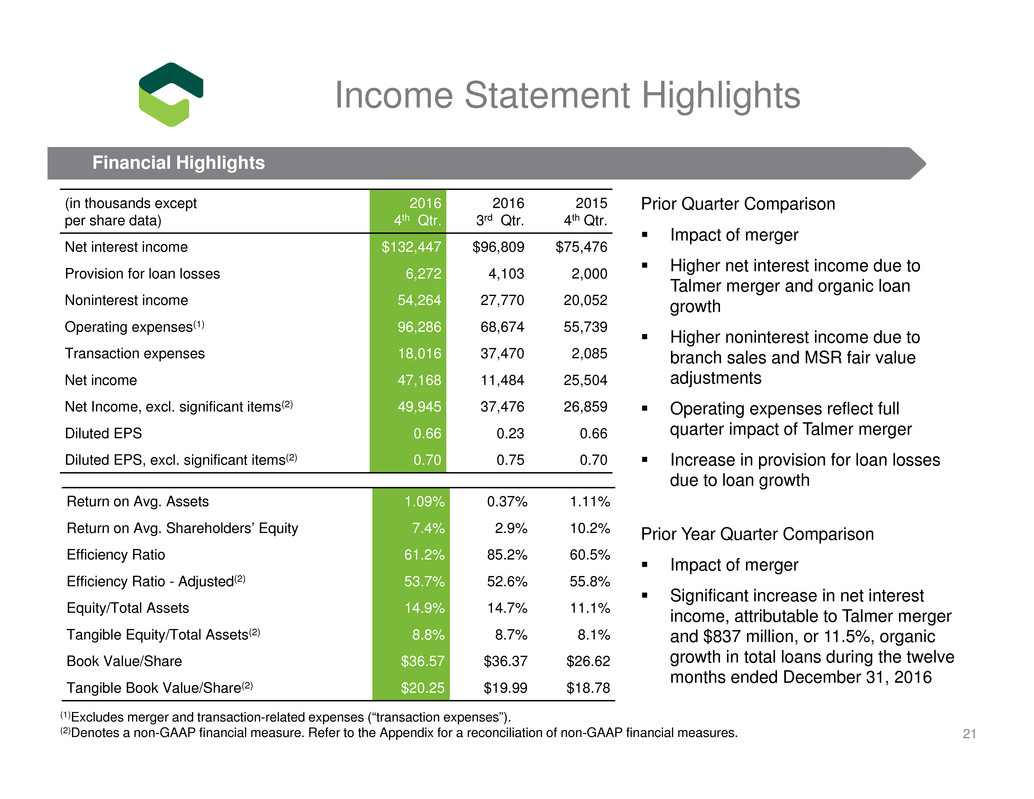
(in thousands except
per share data)
2016
4th Qtr.
2016
3rd Qtr.
2015
4th Qtr.
Net interest income $132,447 $96,809 $75,476
Provision for loan losses 6,272 4,103 2,000
Noninterest income 54,264 27,770 20,052
Operating expenses(1) 96,286 68,674 55,739
Transaction expenses 18,016 37,470 2,085
Net income 47,168 11,484 25,504
Net Income, excl. significant items(2) 49,945 37,476 26,859
Diluted EPS 0.66 0.23 0.66
Diluted EPS, excl. significant items(2) 0.70 0.75 0.70
Return on Avg. Assets 1.09% 0.37% 1.11%
Return on Avg. Shareholders’ Equity 7.4% 2.9% 10.2%
Efficiency Ratio 61.2% 85.2% 60.5%
Efficiency Ratio - Adjusted(2) 53.7% 52.6% 55.8%
Equity/Total Assets 14.9% 14.7% 11.1%
Tangible Equity/Total Assets(2) 8.8% 8.7% 8.1%
Book Value/Share $36.57 $36.37 $26.62
Tangible Book Value/Share(2) $20.25 $19.99 $18.78
21
Prior Quarter Comparison
Impact of merger
Higher net interest income due to
Talmer merger and organic loan
growth
Higher noninterest income due to
branch sales and MSR fair value
adjustments
Operating expenses reflect full
quarter impact of Talmer merger
Increase in provision for loan losses
due to loan growth
Prior Year Quarter Comparison
Impact of merger
Significant increase in net interest
income, attributable to Talmer merger
and $837 million, or 11.5%, organic
growth in total loans during the twelve
months ended December 31, 2016
(1)Excludes merger and transaction-related expenses (“transaction expenses”).
(2)Denotes a non-GAAP financial measure. Refer to the Appendix for a reconciliation of non-GAAP financial measures.
Income Statement Highlights
Financial Highlights

$13.8 $16.2 $16.8 $15.3
$17.8
$19.0 $24.5
$25.5
$23.6 $25.8
$11.5
$47.1
$26.0
$2.8
$0.47
$0.70
$0.00
$0.50
$1.00
$0.0
$20.0
$40.0
$60.0
Q1 Q2 Q3 Q4 Q1 Q2 Q3 Q4 Q1 Q2 Q3 Q4
E
P
S
N
e
t
I
n
c
o
m
e
Significant items (after-tax)
Net Income
EPS, Excluding significant items (non-GAAP)(3)
2014 2015 2016
22
(1)Net Income
(2)Net Income, excluding significant items (Non-GAAP). Please refer to the Appendix for a reconciliation of
non-GAAP financial measures.
(3)Denotes a non-GAAP financial measure. Please refer to the Appendix for a reconciliation of non-GAAP
financial measures.
2015 Total: $86.8(1); $92.3(2)2014 Total: $62.1(1); $66.7(2) 2016 Total: $108.0(1); $140.5(2)
$26.9(2)
$49.9(2)
Net Income
Net Income Trending Upward ($ Millions, except EPS data)
$37.5(2)

$88
$277
$125
$347
$18
$143$39
$75
Commercial
CRE/C&D
Residential
Consumer
$0
$100
$200
$300
Q1 Q2 Q3 Q4 Q1 Q2 Q3 Q4 Q1 Q2 Q3 Q4
23
2014 - $565 2015 - $476 2016 - $837
$106
$145 $142
$15
$172
$224
$181
$280
$56
$275$837
$96
$186
Loan Growth* ($ Millions)
Quarterly Loan Growth Trends
Loan Growth – 2016 Total* Loan Growth – 2016 Q4
$275
*Excludes the impact of the $4.88 billion of loans acquired in the Talmer merger.

4Q 2016 2016 Total
Originated Loan Portfolio
Commercial $ 177 $ 380
CRE/C&D 307 594
Residential 104 258
Consumer 114 418
Total Originated Loan Portfolio Growth $ 702 $1,650
Acquired Loan Portfolio
Commercial $(164) $(292)
CRE/C&D (159) (318)
Residential (65) (133)
Consumer (39) (70)
Total Acquired Loan Portfolio Run-off $(427) $(813)
Total Loan Portfolio
Commercial $ 18 $ 88
CRE/C&D 143 276
Residential 39 125
Consumer 75 348
Total Loan Portfolio Growth $ 275 $ 837
24
Loan Growth* – Originated v. Acquired
Loan Growth (Run-off) ($ Millions)
*Excludes the impact of the $4.88 billion of loans acquired in the Talmer merger.

$9.9
$2.8
$0.3
$1.6
Deposits:
Time Deposits
Customer Repurchase
Agreements
Wholesale borrowings (at
Dec. 31, 2016: brokered
deposits - $0.2, FHLB
advances - $1.3, other - $0.1)
25
Average Cost of Funds Q4 2016 – 0.33%Average Cost of Funds Q3 2016 – 0.25%(1)
$14.7 Billion $14.6 Billion
$9.9
$2.9
$0.3 $1.6
Interest and
noninterest-bearing,
demand, savings,
money market
Average cost of wholesale
borrowings – 1.11%
Average cost of wholesale
borrowings – 0.56%
Funding Breakdown ($ Billions)
(1)Reduced by 4 basis points for acceleration of accretion
of fair value adjustments on FHLB borrowings
September 30, 2016 December 31, 2016

$1.6 $1.5 $1.5 $1.5 $1.5 $1.5 $1.5 $2.0 $1.5
$3.0
$4.1
$6.3
$2.2 $2.2 $2.3
$2.8
$1.9 $1.8 $0.8
$4.3 $4.5
$1.8 $1.8 $1.8
$0.0
$3.5
$7.0
Q1 Q2 Q3 Q4 Q1 Q2 Q3 Q4 Q1 Q2 Q3 Q4
Provision for Loan Losses Net Loan Losses
$103 $78 $71 $62 $51 $62 $53 $44 $41 $44
$0
$60
$120
YE 2010 YE 2011 YE 2012 YE 2013 YE 2014 YE 2015 2016 Q1 2016 Q2 2016 Q3 2016 Q4
26
ALL
NPLs
2014 2015 2016
Originated Loans ($ billions) $3.1 $3.3 $3.8 $4.3 $5.0 $5.8 $6.0 $6.4 $6.7 $7.5
Acquired Loans ($ billions) 0.6 0.5 0.4 0.3 0.7 1.5 1.4 1.2 6.0 5.5
Total Loans ($ billions) $3.7 $3.8 $4.2 $4.6 $5.7 $7.3 $7.4 $7.6 $12.7 $13.0
ALL $90 $88 $84 $79 $76 $73 $70 $72 $74 $78
ALL/ Originated Loans 2.86% 2.60% 2.22% 1.81% 1.51% 1.26% 1.17% 1.12% 1.09% 1.05%
NPLs/ Total Loans 2.80% 2.05% 1.71% 1.33% 0.89% 0.86% 0.73% 0.58% 0.32% 0.34%
Credit Mark as a % of
Unpaid Principal on
Acquired Loans
6.5% 6.6% 6.0% 7.8% 5.4% 4.4% 4.5% 4.1% 3.0% 3.1%
Credit Quality ($ Millions, unless otherwise noted)
Provision for Loan Losses vs. Net Loan Losses
Nonperforming Loans (NPLs) and Allowance for Loan Losses (ALL)

$59.2
$65.7
$73.6 $75.5 $74.3
$77.5
$96.8
$132.4
$40
$60
$80
$100
$120
$140
Q1 Q2 Q3 Q4 Q1 Q2 Q3 Q4
N
e
t
I
n
t
e
r
e
s
t
I
n
c
o
m
e
(
$
M
i
l
l
i
o
n
s
)
Net Interest Income
27
3.55% 3.59% 3.55%
3.64% 3.60%
3.70% 3.58% 3.56%
0.04% 0.04% 0.04% 0.04% 0.03%
0.11% 0.11% 0.14%
4.16% 4.17% 4.15% 4.16% 4.13% 4.19% 4.12% 4.18%
0.00%
2.50%
5.00%
Q1 Q2 Q3 Q4 Q1 Q2 Q3 Q4
Net Interest Margin(1) and Loan Yields(1)
Net Interest Margin(1)
Purchase Accounting Accretion on Loans
Loan Yields
2015 2016
2015 2016
Net Interest Income
Net Interest Income, Net Interest Margin
and Loan Yields
(Quarterly Trend)
(1)Computed on a fully taxable equivalent basis (non-GAAP) using a federal income tax rate of 35%. Please refer to the Appendix for a reconciliation
of non-GAAP financial measures.
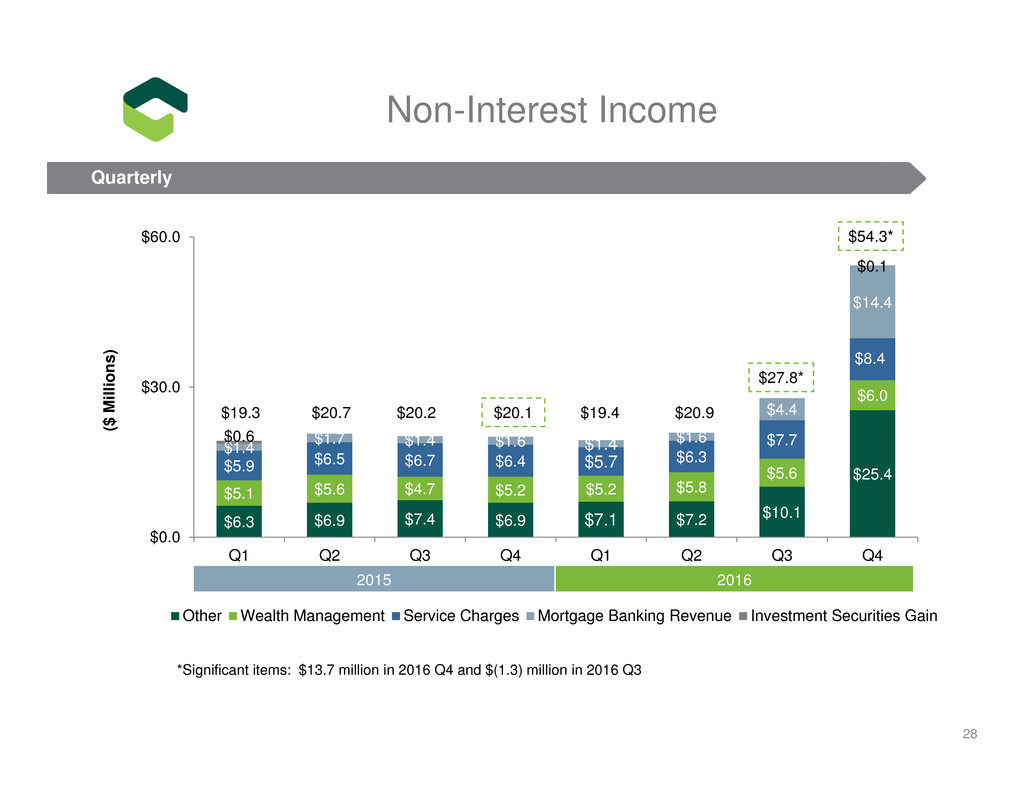
$6.3 $6.9 $7.4 $6.9 $7.1 $7.2 $10.1
$25.4
$5.1 $5.6 $4.7 $5.2 $5.2 $5.8
$5.6
$6.0
$5.9 $6.5 $6.7 $6.4 $5.7 $6.3
$7.7
$8.4
$1.4 $1.7 $1.4 $1.6 $1.4
$1.6
$4.4
$14.4
$0.6
$0.1
$0.0
$30.0
$60.0
Q1 Q2 Q3 Q4 Q1 Q2 Q3 Q4
Other Wealth Management Service Charges Mortgage Banking Revenue Investment Securities Gain
2015 2016
(
$
M
i
l
l
i
o
n
s
)
28
$20.7$19.3 $19.4$20.2 $20.1
$27.8*
$54.3*
Non-Interest Income
Quarterly
$20.9
*Significant items: $13.7 million in 2016 Q4 and $(1.3) million in 2016 Q3
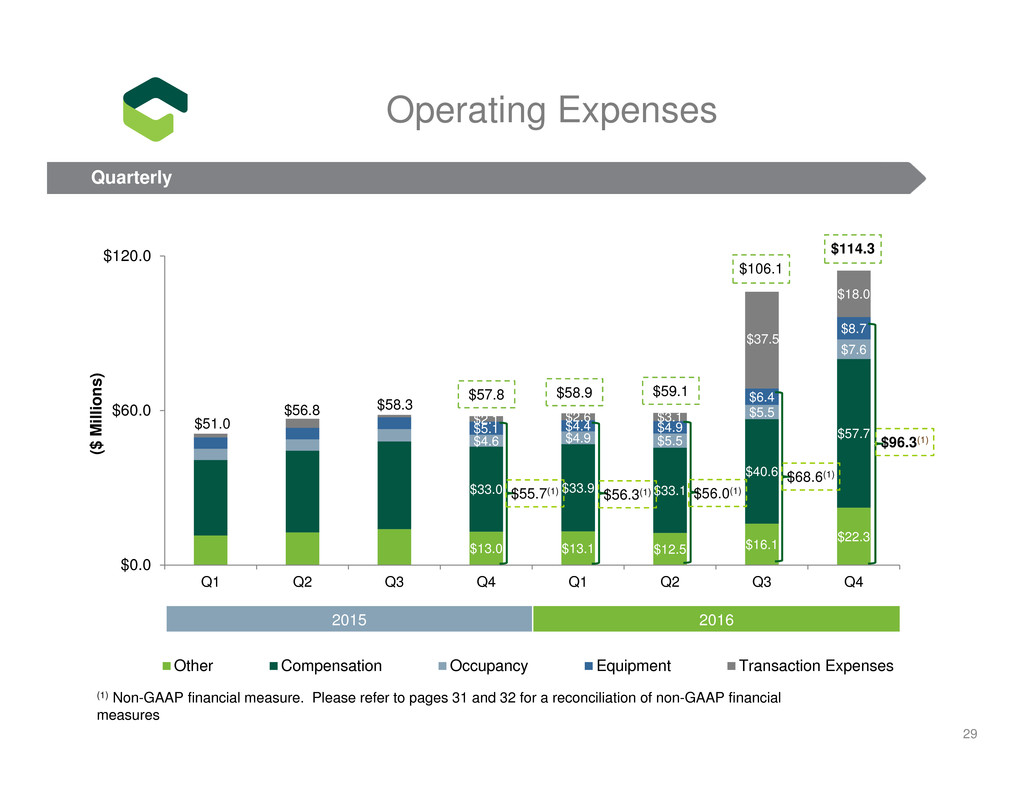
$13.0 $13.1 $12.5 $16.1
$22.3
$33.0 $33.9 $33.1
$40.6
$57.7$4.6 $4.9 $5.5
$5.5
$7.6
$5.1 $4.4 $4.9
$6.4
$8.7
$2.1 $2.6 $3.1
$37.5
$18.0
$0.0
$60.0
$120.0
Q1 Q2 Q3 Q4 Q1 Q2 Q3 Q4
Other Compensation Occupancy Equipment Transaction Expenses
$114.3
(1) Non-GAAP financial measure. Please refer to pages 31 and 32 for a reconciliation of non-GAAP financial
measures
2015 2016
29
(
$
M
i
l
l
i
o
n
s
)
$56.8
$51.0
$58.3
$56.0(1)
$57.8 $59.1
$56.3(1)
$58.9
$55.7(1)
$68.6(1)
$106.1
Operating Expenses
Quarterly
$96.3(1)

Peer Average
9/30/2016(1)
CHFC
9/30/2016
CHFC
12/31/2016
Tangible Book Value / Share(2) NA $19.99 $20.20
Tangible Common Equity / Total Assets(2) 8.3% 8.7% 8.8%
Tier 1 Capital(3) 10.8% 10.6% 10.7%
Total Risk-Based Capital(3) 12.6% 11.1% 11.5%
$20.20
$1.06 $0.49
$18.78
$2.81 $0.16
$0
$5
$10
$15
$20
$25
TBV @ 12/31/2015 Net Income
(Excl. Transaction
Expenses)
Dividends Talmer AOCI Adj.
& Other
TBV @ 12/31/2016
30
Capital
Tangible Book Value and Capital Ratios
Tangible Book Value(2) (TBV) Roll Forward
(1)Source SNL Financial – ASB, WTFC, CBSH, TCB, UMBF, MBFI, PVTB, ONB, FMBI and FFBC (ordered by asset size).
(2)Denotes a non-GAAP financial measure. Refer to the Appendix for a reconciliation of non-GAAP financial measures.
(3)Estimated at December 31, 2016

4Q 2016 3Q 2016 4Q 2015
Shareholders’ equity $ 2,581,526 $ 2,563,666 $ 1,015,974
Goodwill, CDI and non-compete agreements, net of tax (1,155,617) (1,154,121) (299,123)
Tangible shareholders’ equity $ 1,425,909 $ 1,409,545 $ 716,851
Common shares outstanding 70,599 70,497 38,168
Tangible book value per share $20.20 $19.99 $18.78
Total assets $17,355,179 $17,383,637 $9,188,797
Goodwill, CDI and non-compete agreements, net of tax (1,155,617) (1,154,121) (299,123)
Tangible assets $16,199,562 $16,229,516 $8,889,674
Tangible shareholders’ equity to tangible assets 8.8% 8.7% 8.1%
Net income $47,168 $11,484 $25,504
Significant items, net of tax 2,777 25,992 1,355
Net income, excluding significant items $49,945 $37,476 $26,859
Diluted earnings per share $0.66 $0.23 $0.66
Effect of significant items, net of tax 0.04 0.52 0.04
Diluted earnings per share, excluding significant items $0.70 $0.75 $0.70
Average assets $17,264,688 $12,250,730 $9,175,224
Return on average assets 1.09% 0.37% 1.11%
Effect of significant items, net of tax 0.07% 0.85% 0.06%
Return on average assets, excluding significant items 1.16% 1.22% 1.17%
Average shareholders’ equity $ 2,564,943 $1,559,668 $1,000,347
Return on average shareholders’ equity 7.4% 2.9% 10.2%
Effect of significant items, net of tax 0.4% 6.7% 0.5%
Return on average shareholders’ equity, excluding significant items 7.8% 9.6% 10.7%
31
Non-GAAP Reconciliation
(Dollars in thousands, except per share data)

4Q 2016 3Q 2016 4Q 2015
Efficiency Ratio:
Total revenue – GAAP $ 186,711 $ 124,579 $ 95,528
Net interest income FTE adjustment 2,945 2,426 2,042
Significant items (13,819) 1,043 (42)
Total revenue – Non-GAAP $175,837 $ 128,048 $ 97,528
Operating expenses – GAAP $114,302 $ 106,144 $ 57,824
Transaction expenses (18,016) (37,470) (2,085)
Amortization of intangibles (1,843) (1,292) (1,341)
Operating expenses – Non-GAAP $ 94,443 $ 67,382 $ 54,398
Efficiency ratio – GAAP 61.2% 85.2% 60.5%
Efficiency ratio – adjusted 53.7% 52.6% 55.8%
Net Interest Margin:
Net interest income – GAAP $132,447 $96,809 $75,476
Adjustments for tax equivalent interest:
Loans 838 777 652
Investment securities 2,107 1,649 1,390
Total taxable equivalent adjustments 2,945 2,426 2,042
Net interest income (on a tax equivalent basis) $ 135,392 $99,235 $77,518
Average interest-earning assets $15,156,107 $11,058,143 $8,457,464
Net interest margin – GAAP 3.48% 3.49% 3.55%
Net interest margin (on a tax-equivalent basis) 3.56% 3.58% 3.64%
32
Non-GAAP Reconciliation
(Dollars in thousands, except per share data)

